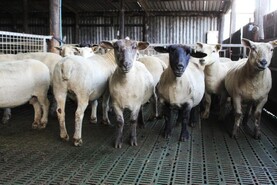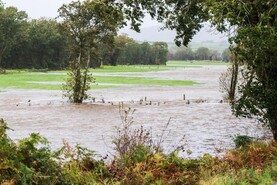Body condition
With autumn calving starting on some farms, there are a few points to note. Keep an eye on body condition score and make sure cows do not put on excess condition at grass. If cows are over-conditioned, you could run into issues with calving difficulties. Make sure that cows are covered for dry cow minerals ahead of calving as deficiencies can lead to still births, weak calves and retained placentas.
A bolus is one of the ways you can guarantee getting the minerals in and it keeps them covered for a few weeks but in most case it will not fix minerals that are very low. Having cows in a paddock close to the farmyard and handling facilities where cows can be housed at night for checking works well.
Ploughing
The livestock demos on our stand at the Ploughing Championships went through some bedding material options for sheds this winter. With fodder short on many farms, especially in the southeast, straw will and should be used for feeding rather than bedding. Straw is also quite expensive on farms in the northwest, where haulage costs add a lot to the price.
So what are the options? Peat seems to be a real viable option on a lot of farms. On Tullamore Farm, we have paid €30/bale for 4x4 round bales of straw. Peat is costing €20/m3 delivered to the farm. We reckon it’s about 50% of the price of straw based on usage levels last year and prices this year.
A few things to be mindful of. Make sure to vaccinate against clostridial disease if you are bedding animals on peat. As with all bedding materials, if you can cut down on bedding used around the feed area, it will reduce usage. Placing a piece of timber or used telephone pole on the floor of the shed to hold back bedding from the front feeding area is a good tip. The other issue to consider is it might be easier to use some of these other options (peat, woodchip, etc) earlier in the winter and keep the better-quality straw for calving time.
Some beef farmers at the Ploughing questioned how peat or indeed woodchip might be handled or stored once its finished as bedding. The message is woodchip should be stored on concrete if possible and given time to break down before land-spreading.
The other option is to land spread on a field earmarked for reseeding and plough it down. Used peat bedding should be spread thinly as heavy spreading could lead to changes in soil pH.
Credit
I spoke to a number of merchants at the Ploughing who said that they have a high amount of bills outstanding with farmers. This is expensive credit, with some charging 1.5% per month. Organising a term loan or short-term loan would be a better option. Contractors and merchants are an important part of the farm business and if at all possible they need to be kept paid to make sure everything runs smoothly.






 This is a subscriber-only article
This is a subscriber-only article










SHARING OPTIONS: